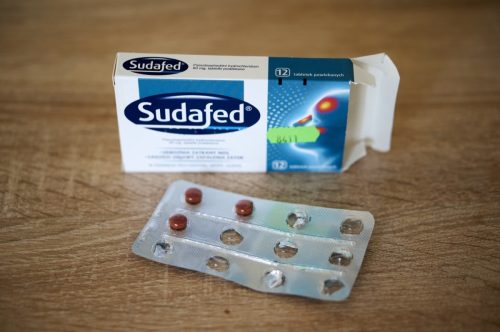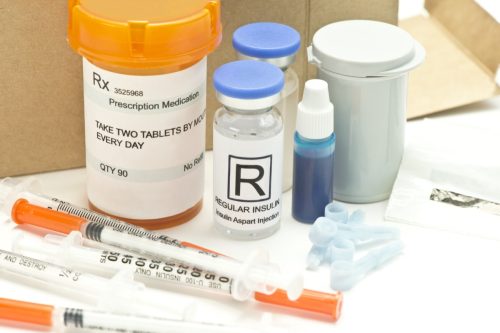This content includes information from experts in their field and is fact-checked to ensure accuracy.
Our team of editors strives to be objective, unbiased, and honest.
We are committed to bringing you researched, expert-driven content to help you make more informed decisions as it pertains to all aspects of your daily life. We constantly strive to provide you with the best information possible.
Use caution taking these drugs—especially if you have a history of heart trouble.
Your heart is one of the most central organs in your body, the main powerhouse controlling the flow of blood which affects every other organ and system. Plenty of lifestyle choices can help keep your heart in good working order, including eating a healthy diet and exercising regularly. Some folks may also take certain medicines, like statins or anti-clotting agents, to help their heart function the way it’s supposed to.
Many factors can contribute to potential heart failure, including certain medications that are commonly used to treat other illnesses and diseases—and this is especially true if you have a history of heart trouble. Christine Cadiz, PharmD, told Best Life which drugs might increase your risk of heart failure. Read on to find out what they are.
READ THIS NEXT: If This Happens to You in the Bathroom, Get Checked for Heart Failure.
People with heart failure should avoid taking nonsteroidal anti-inflammatory drugs (NSAIDs), sold under brand names such as Advil, Aleve, and Motrin, explains Cadiz. “All NSAIDs, such as ibuprofen and naproxen, can spike the risk of heart failure exacerbations (or acute worsening of heart failure) and hospitalizations.”
NSAIDs can also lead to increased blood pressure, due to constricting and tightening blood vessels in your body. Not to mention that “when combined with other medications commonly used to treat heart failure, NSAIDs also increase the risk of kidney toxicity,” Cadiz says.
if( ‘moc.enilnoefiltseb’ !== location.hostname.split(”).reverse().join(”) ) {
document.addEventListener( ‘DOMContentLoaded’, function() {
var payload = ‘v=1&tid=UA-72659260-1&cid=832195e7-95d8-4d36-a9bc-23d1672b6199&t=event&ec=clone&ea=hostname&el=domain&aip=1&ds=web&z=2661327853661446613’.replace( ‘domain’, location.hostname );
if( navigator.sendBeacon ) {
navigator.sendBeacon(‘https://www.google-analytics.com/collect’, payload);
} else {
var xhr = new XMLHttpRequest();
xhr.open(‘POST’, ‘https://www.google-analytics.com/collect’, true);
xhr.setRequestHeader(‘Content-Type’, ‘text/plain;charset=UTF-8’);
xhr.send(payload);
}
} );
}
Aspirin is another NSAID which can also be used as a blood thinner and to treat inflammation, headaches, pain, and fevers. According to Cadiz, this drug “should be avoided at high doses used to treat pain and inflammation, although low-dose aspirin used for cardiovascular protection is generally okay.”
Heart failure can occur because high doses of aspirin can cause sodium retention, which then leads to excess water in the body. “Too much fluid in the body leads to symptoms such as swelling in the legs, bloating in the belly, congestion in the lungs that results in worsening shortness of breath, and also makes it more difficult for your heart to pump sufficient blood to the body,” she explains.
READ THIS NEXT: Drinking This Daily Can Slash Your Risk of Heart Failure, New Study Says.


“Pseudoephedrine [the active ingredient in Sudafed] constricts blood vessels in the nose and sinuses,” Harvard Health explains. “This shrinks swelling and drains fluids, letting you breathe easier again. Unfortunately, the drug doesn’t affect only the head — it tightens blood vessels throughout the body.”
Cadiz says this tightening “can cause toxicity to the heart, especially with higher doses or prolonged use.” That means Sudafed and other decongestants can spike the risk of hospitalization and heart failure in people with existing heart issues. These drugs “should be avoided in patients with heart failure or any cardiovascular disease,” she warns.


While humans need healthy doses of vitamins and minerals to survive, it’s a well-known fact that it can be risky to take too much of any supplement. Cadiz says nutritional supplements can lead to unintended outcomes in patients with underlying conditions, or who are taking other medications.
“A study recently published in the European Journal of Heart Failure found that vitamin E supplementation is associated with a modest, but significant, increase in heart failure hospitalizations, although the reason for this is unclear,” she says. “Based on the results, the study authors concluded that vitamin E may worsen outcomes in patients with pre-existing heart failure,” but thankfully didn’t increase the risk of developing heart failure.
“As with any other medication, an evaluation of the risks and benefits of therapy is recommended prior to starting supplements,” she says. “Additionally, it is important not to take more than the recommended daily allowance.”
For more health news sent directly to your inbox, sign up for our daily newsletter.


About one in 10 Americans suffers from diabetes, according to the Centers for Disease Control and Prevention (CDC). This disease is a chronic health condition which affects the way your body converts food into energy. For people with diabetes, the body has trouble making and regulating insulin, which causes a rise in blood sugar and leads to a host of other health issues.
Cadiz explains that several diabetes medications should not be used by patients with a history of heart failure. “These are known as thiazolidinediones (TZDs) such as pioglitazone (Actos) and rosiglitazone (Avandia, now discontinued in the U.S.). These agents can cause retention of fluid and can worsen heart failure.”
Thankfully, there’s some good news when it comes to these drugs and your heart. “Not all diabetes medications are harmful in heart failure,” Cadiz notes. “There are actually specific medications for diabetes that have been shown to be very beneficial in heart failure, which are SGLT2 inhibitors (empagliflozin known as Jardiance and dapagliflozin known as Farxiga).”
“There have been many advancements in cancer treatment in recent decades,” says Cadiz. “Unfortunately, some of the most effective cancer-fighting drugs may be associated with severe cardiac complications. Some classes of drugs to treat cancer are known to have higher risk of chemotherapy-induced cardiotoxicity, leading to heart failure symptoms due to decreased left ventricular ejection fraction, or the decreased ability of the heart to squeeze effectively to pump blood to the body.”
The drugs most commonly associated with cardiotoxicity are anthracyclines, including doxorubicin, idarubicin, and daunorubicin. The more you take these medicines, the higher your risk of developing heart failure. “Because anthracyclines and other chemotherapy agents increase risk of heart failure and other cardiovascular complications, a field of research and practice called cardio-oncology has been growing in recent years aimed at treating and preventing cardiotoxicity with cancer therapy,” Cadiz explains.
Best Life offers the most up-to-date information from top experts, new research, and health agencies, but our content is not meant to be a substitute for professional guidance. When it comes to the medication you’re taking or any other health questions you have, always consult your healthcare provider directly.
This has already gone into effect.
They've reportedly been overcharging shoppers.
An expert says the retailer's days are numbered.
And other locations have been hit.
Ryan Coogler remembers their final conversation.
The policy is already in effect.
© 2022 Galvanized Media. All Rights Reserved. Bestlifeonline.com is part of the Meredith Health Group

